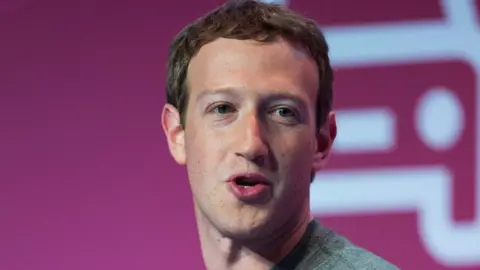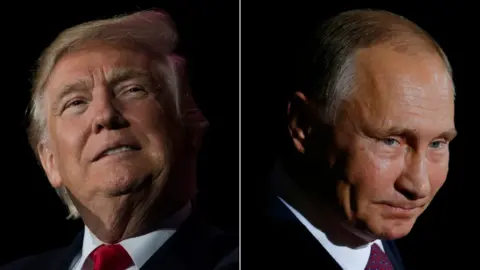Facebook to share Russia-linked political adverts with investigators
 Getty Images
Getty ImagesFacebook founder Mark Zuckerberg says his company will share 3,000 Russia-linked political adverts with US investigators.
He also pledged to make political advertising more transparent on his network in future.
"We will work with others to create a new standard for transparency for online political ads," he said in a live address on his Facebook profile.
He said political advertising will now carry disclaimers about which campaign or organisation paid for it.
He added that the company was continuing to investigate instances of foreign actors abusing its advertising platform, including Russia and other "former Soviet states".
The move to share details with investigators comes after considerable public pressure for Facebook to be more transparent - and is being interpreted by some as an attempt to fend off any potential regulation from the US government.
But US President Donald Trump questioned the decision in a tweet on Friday morning.
"The Russia hoax continues, now it's ads on Facebook. What about the totally biased and dishonest media coverage in favor of Crooked Hillary?" he said, referring to Hillary Clinton, the rival he defeated in the 2016 US presidential election.
What are the adverts?
Earlier this month it was revealed that politically-charged advertising had been targeted at American voters, paid for, Facebook believed, by Russian actors with links to the Kremlin.
The adverts did not support a specific candidate, Facebook said, but instead posted inflammatory information on hot topics, such as immigration.
The company said it would share details of those advertisements with a wide-ranging US investigation into Russian meddling in 2016's presidential election.
Why is Facebook sharing them?
In a blog post explaining the move, Facebook's head of policy, Elliot Schrage, wrote: "After an extensive legal and policy review, we've concluded that sharing the ads we've discovered with Congress, in a manner that is consistent with our obligations to protect user information, will help government authorities complete the vitally important work of assessing what happened in the 2016 election.
"That is an assessment that can be made only by investigators with access to classified intelligence and information from all relevant companies and industries - and we want to do our part.
"Congress is best placed to use the information we and others provide to inform the public comprehensively and completely."
Democratic Senator Mark Warner, the vice chairman of the Senate Intelligence Committee, praised Facebook's decision.
Kremlin spokesman Dmitry Peskov said earlier this month that Russia had nothing at all to do with the advertising.
"We have never heard of this, we do not know anything about this, let alone have anything to do with these affairs," he was quoted as saying by the state news agency Tass.
 AFP/Getty
AFP/GettyWhat is Facebook's new advertising policy?
In his address, Mr Zuckerberg detailed how he planned to make political advertising more transparent, bringing it more in line with how broadcasts are regulated.
"When someone buys political ads on TV or other media, they're required by law to disclose who paid for them. But you still don't know if you're seeing the same messages as everyone else," he said.
"So we're going to bring Facebook to an even higher standard of transparency. Not only will you have to disclose which page paid for an ad, but we will also make it so you can visit an advertiser's page and see the ads they're currently running to any audience on Facebook."
Finally, Mr Zuckerberg said his firm was working to protect the integrity of the upcoming elections in Germany. He said action had been taken against thousands of "fake accounts", and was partnering with the country's Federal Office for Information Security.
